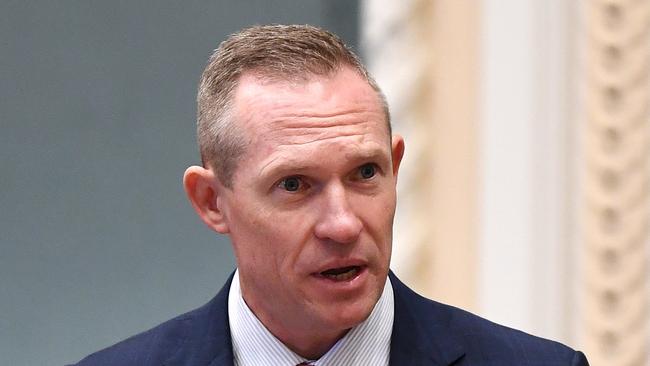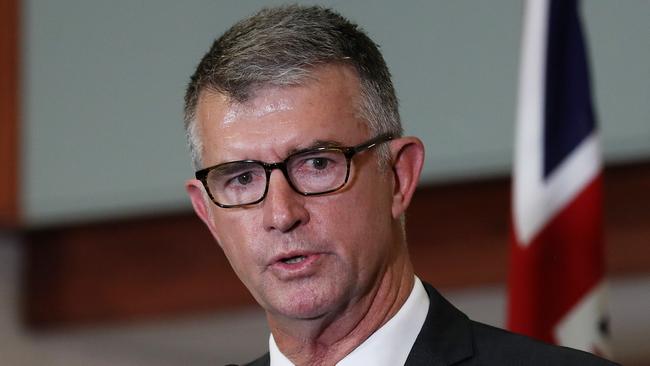Queensland’s building industry watchdog has wound back services to contractors and applicants seeking a license
Changes at the QBCC, outlined in leaked correspondence obtained by The Courier Mail, have stunned industry veterans, who warn they will create substantial problems for tradies.

QLD Business
Don't miss out on the headlines from QLD Business. Followed categories will be added to My News.
Queensland’s beleaguered building industry watchdog has made a shock move to wind back services to contractors and applicants seeking a licence.
The changes, outlined in leaked correspondence obtained by The Courier Mail, have stunned industry veterans, who warn it will create substantial problems for tradies looking for guidance on what jobs they can tackle.
The shake-up comes despite a significant increase in staffing and funding levels at the Queensland Building and Construction Commission over the past five years.
In an email sent out statewide on November 22, QBCC assistant licensing manager Ryan Baker directed staff to no longer provide information to applicants as to what licence they will need to carry out building work regulated under the QBCC Act.
Instead, they should be told to “interpret the legislation themselves” or “seek their own legal advice,’’ he said.
“I understand the Commission has in the past provided such advice, however going forward we should avoid doing so,’’ Mr Baker wrote.
“Building contractors need to read and interpret the legislation themselves when making decisions about what their licence class allows them to build (or not build).
“If they do not have the confidence or skill to interpret the legislation then they should seek independent legal advice or run with the advice of their chosen professional.’’

The directive effectively scraps what former QBCC executives say has been normal practice by the regulator for decades.
“The QBCC is responsible for prosecuting people for unlicensed work. It is unreasonable and irresponsible to refuse to assist applicants and licensees who are seeking information so that they can comply with the law and not be prosecuted,’’ one ex-insider said.
“Education of contractors is the first line of defence in protecting the community from the harm associated with unlicensed defective work.
“Licensees and applicants often cannot afford to obtain legal advice, especially for licensing questions that could ordinarily be expected to be within the knowledge of the regulator.”
Mr Baker also tells his staff in the email that the QBCC will no longer be making its own assessment as to whether an applicant for a licence has “an equivalent qualification” to the one described in legislation.
Under this new change, applicants for a licence who do not have the latest qualification will have to engage at their own cost a registered training organisation (RTO) to “map” the qualifications and make the decision.
“The commission is not qualified to determine training gap requirements,’’ Mr Baker wrote.
Critics say the there is no provision in the QBCC Act to support this new approach or for the QBCC to delegate the decision to an RTO, which is not always readily accessible and typically charges $3000 or more for such a service
In addition, they point out that the regulator has been carrying out equivalency assessments for years and has several internal units to provide such services.
“I am told by my contacts at the QBCC that the new changes are part of a broader QBCC initiative to ‘subtlety’ do less without being noticed,’’ one former senior executive said.
“It has also been brought on by the related ‘skills drain’ that the QBCC has experienced in the last 12 months.”

The most recently available records show that full-time staff at the QBCC has swelled to about 520, up 33 per cent since 2016.
The agency’s income has also risen substantially in that time, from $217.4m to $303.3m.
A QBCC spokesman said Tuesday the agency “continues to respond to inquiries about licensing matters, however, given their complexity this sometimes includes suggesting that individuals seek legal advice’’.
Public Works and Procurement Minister Mick de Brenni distanced himself from the policy changes at the regulator that he oversees.
Mr de Brenni, who has announced an independent governance review of the QBCC following months of harsh criticism, declined to comment other than to say that “this is an operational matter for the Commission’’.
But the Opposition accused Mr de Brenni and the QBCC of “abandoning’’ the industry.
“Helping tradies understand their licence requirements should be the building regulator’s bread and butter,’’ said Tim Mander, the shadow Minister for Housing and Public Works.
“One of the key reasons the QBCC exists is to support and regulate the work tradies do. If they’re not doing this, then what on earth are they doing?
“Mick de Brenni is the minister in charge of this mess. The only way to stop the QBCC lurching from crisis to crisis is to find a new minister who can, and is willing, to properly oversee it.’’


